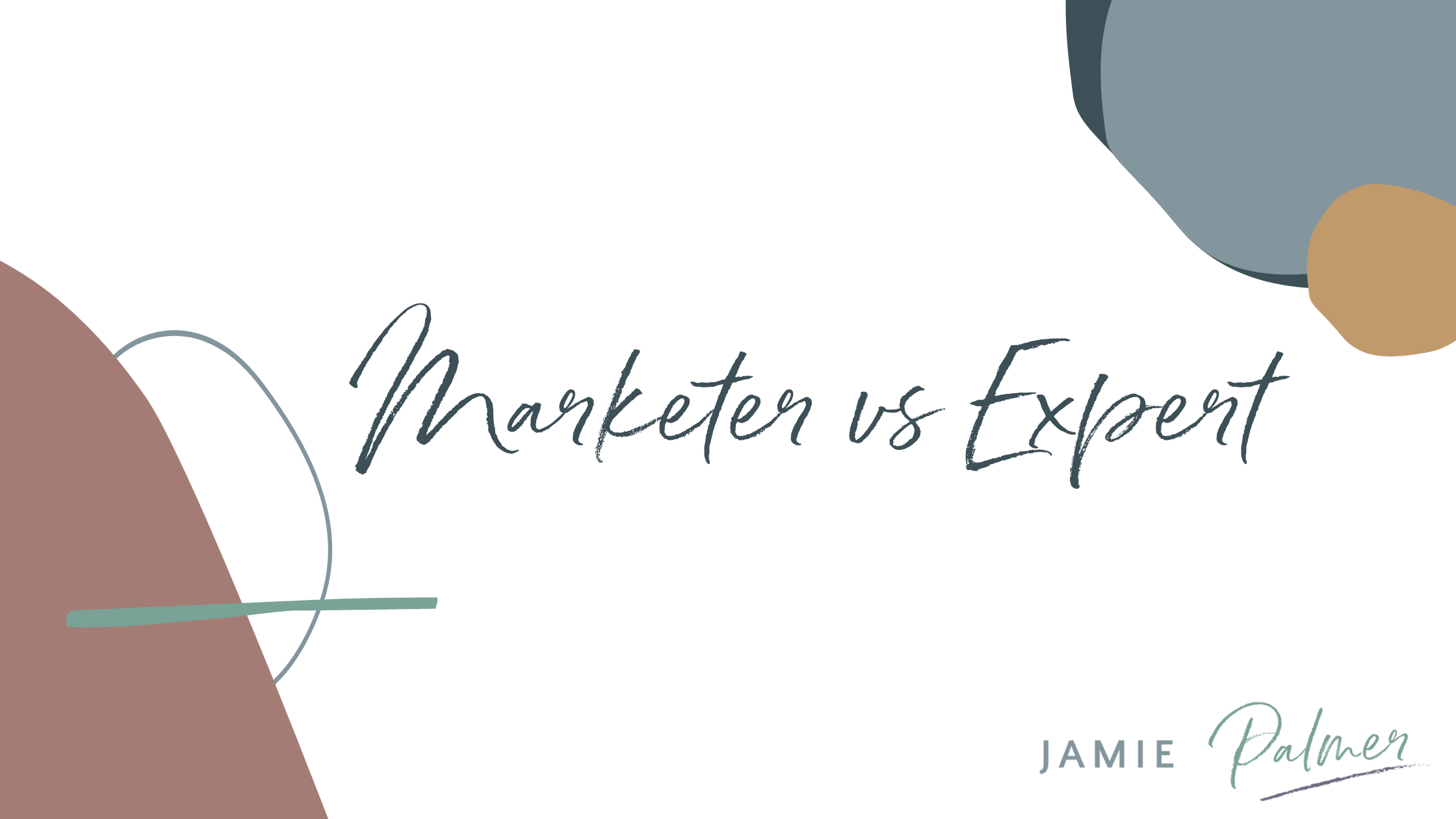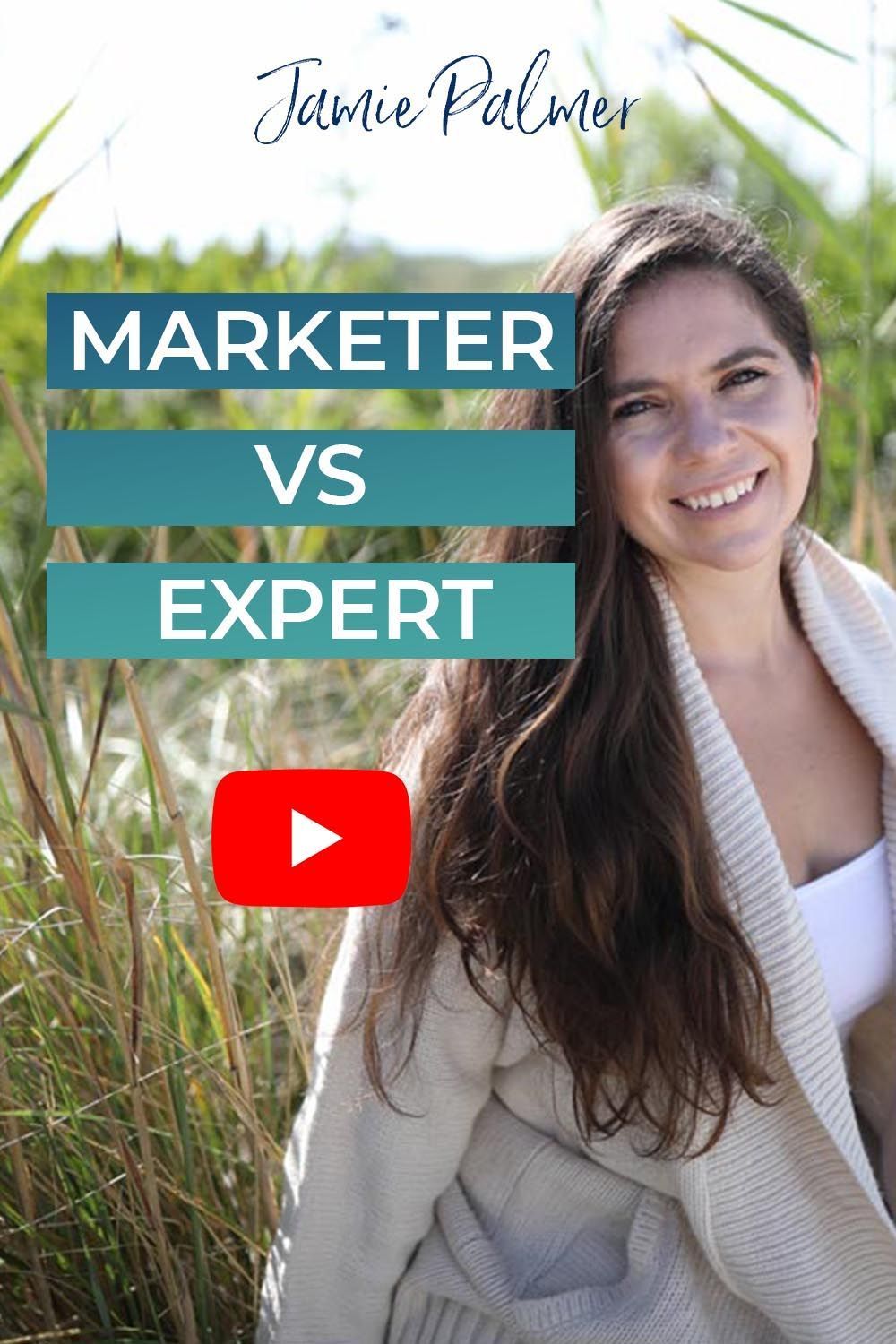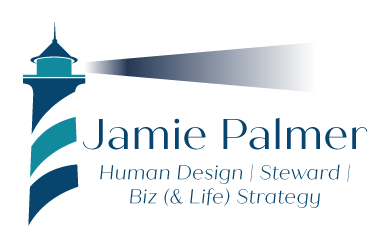
A very common mistake online entrepreneurs make is that they constantly have their expert hat on, and it often results in them giving away free advice. It results in them literally repelling their ideal clients. The ideal client does not understand what they are talking about because of the technical jargon or they feel overwhelmed. It’s an unnatural way to sell. I recently did a podcast about how people love to buy, hate to be sold, and talk about how to find the right balance. It’s easier for us to put our expert’s hat on than to actually be a marketer or to be a salesperson.
For myself and in my industry especially, I see these people who are so underqualified from an expert perspective, yet they are crushing it with sales because they are really, really good at marketing. Personally, that drives me completely bananas! I believe that if you have an awareness of when you should be marketing and when you should be an expert, it becomes easier to oscillate back and forth between which hat you should wear and when.
What is a Marketer?
A marketer is a person or a company that advertises or promotes something.
What is an Expert?
An expert is defined as a person who has a comprehensive and authoritative knowledge of a skill or knowledge in a particular area. You can also think of an expert as somebody who has done 10,000 hours. (The 10,000-hour rule: it roughly takes you 10 years to become a well-known expert).
I bring this up because when you think about what it means to be an expert in marketing versus a marketer I would contend that it comes down to understanding how your ideal client speaks about the problem that they believe they have and you have the solution for.
More often than not, there is a disconnect. Here’s an example of a client of mine: Steven Greene of Make the Grade. He’s an amazing educator and has been in the education space for many years. He helps parents and students to get organized, create systems, and create a plan for success. Unfortunately, most parents don’t believe that that’s what their student needs to be successful.

Most people believe
- that they just need to work harder
- that they don’t have a great teacher
- their child should be getting better grades
- they can’t figure out why their child doesn’t do the homework.
Those are problems parents believe they have. So, if Steven were to market himself by saying, “I have a system to help your student get organized and help them accomplish more and be more successful in school”, they are saying two different things.
Why? Part of that is that’s him being his expert self because he knows the solution really is the underlying problem. The underlying solution is that the kid does not have a system to set them up for success.
- They haven’t created a habit.
- They haven’t established a routine.
He can’t sell that to a parent, however, because that’s not what the parent believes to be the problem. And so that’s Steven being an expert.
As a marketer, Steven has to speak to the problem that the ideal client believes they have because it’s going to be easier for him to get somebody to hit that “Buy Now” button if they’re on the same page. I’ve been guilty of this. My clients have been guilty of this. And I still slip into this mode from time to time!
It is really easy for us to fall into that trap of putting our expert hat on
- by helping people come up with a solution, or
- just by saying, “Here’s a solution, blah blah blah blah blah”, and we completely lose people as a result, because we’re not speaking the same language
It’s as if you were speaking to somebody in French, but they only spoke German, English, or Spanish. It just isn’t going to work.
As you go to market yourself it is very important to understand who your ideal client is:
- What words do they use?
- What language keeps them up at night?
- What motivates them?
- What is status to them and all of those little intricacies?
- What is it that they truly desire?
- What are their beliefs around themselves, their family and their core values?
You need to have an understanding of all of this.
The better understanding you can have about your ideal client, the faster you’re going to close that gap between when somebody first introduces themselves to your brand and when they become a client.
I’ve seen the most ridiculously talented people who I’ve worked with revamp their sales page and go back to expert mode instead of being a marketer. Ultimately that’s great, but there’s such a steep learning curve when it comes to that, that you will often lose your ideal client to somebody who’s not as qualified as you.
So if you are an expert and wonder, “Why can’t I just get these people to convert”, you have to ultimately bridge the gap between where that ideal client believes they are based on your research, versus the language that you use.
For example, I am doing a big Black Friday promotion and I am in the research mode right now to get real time feedback around what people’s biggest struggles are when it comes to marketing and social media. I will use that research as part of my sales page and put it in quotations. Maybe take the most popular ones and integrate that into my marketing, because that way I am speaking to that ideal client. When I’m speaking to them, I want them to be like, “Yes, Jamie. How did you get into my brain?” and that is ultimately one of, if not THE most, important thing you can do to get somebody to go from prospect to buyer, and really bridge and close that gap.
Here are my Ninja Tips on how you can understand when it is time to be an Expert and when it is time to be a Marketer:
- As a general rule of thumb, most of your 90 to 95% front facing marketing for social media should be you as a marketer.
- Your sales pages should be you as a marketer.
- You should be a marketer when you’re speaking to a client, especially if they’re not a referral, and they’re not really warmed up yet.
- You should be a marketer in your nurture sequence.
- You should be an expert when you are sharing some behind-the-scenes content, in your email list for example.
- Your macro content should be you as an expert but sprinkled in with a marketer. So those are a coalescing of the two. When you’re doing webinars and masterclasses, that content should be sprinkled in.
- Your expert self should be sprinkled in on sales calls. And then once somebody purchases from you, you can put that sales hat (marketer) on 24/7, especially once they purchased your signature program. If they haven’t purchased your signature program, but rather a product “Hey, I bought the $47 product”, or in my case, somebody would buy a social media snapshot. If they buy that $47 social media snapshot there’s going to be no selling, it’s going to be all expertise, but I have to leave them wanting more for that next step in the client journey. There’s a lot to talk about in the client journey, but you don’t want to just give it all away in that one first product. You want them to move on to that next product and the next…
- When somebody is in your signature program or your high-level offer, that’s where you can put the expert cap on 24/7, and really get them to move on to that next level.
When you understand your ideal client really well and you can use the exact language your ideal client uses, this becomes very easy. One thing to be aware of is that for most of us entrepreneurs, our default mode is expert and that can be a real challenge. So be mindful of when you’re in expert mode and when you slip back into marketer mode or vice versa.
I highly recommend reading through all your content through the lens of your ideal client. Pay attention because it’s really easy to slip into expert mode! At the start of a sales call you are in a marketing role, and then you can accidentally slip into expert mode, especially when ideal clients are asking you questions. Quickly you get wrapped up in a discussion and then before you know it, you’ve given away a whole bunch of free advice.
Keep in mind when the eyes gaze over and you get the deer in the headlights look, that’s when you know you’ve gone too far with the expert mode! You completely lost the other person because you’re speaking so much techno jargon on them. It’s okay to be a geek about what you do, but you have to always bring it back to that marketer, to get them to take that next step, to get them to move forward.
__________________________
Are you wondering if your social media marketing is even working? Are you posting and hearing crickets? For a limited time, I am offering customized Social Media and Marketing Snapshots for $47. These are a 2 – 3 page action plan designed specifically for your business. Grab yours today ===>>> www.socialmediasnapshot.com






Recent Comments